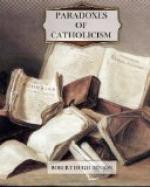Religion then cannot, if it is to be adequate to experience, be a passionless thing. On the contrary it must be passionate, since human nature is passionate too; and it must be a great deal more passionate. It must not moderate grief, but deepen it; not banish joy, but exalt it. It must weep—and bitterer tears than any that the world can shed—with them that weep; and rejoice too—with a joy which no man can take away—with them that rejoice. It must sink deeper and rise higher, it must feel more acutely, it must agonize and triumph more abundantly, if it truly comes from God and is to minister to men, since His thoughts are higher than ours and His Love more burning.
For so did Christ live on earth. At one hour He rejoiced greatly in spirit so that those that watched Him were astonished; at another He sweated blood for anguish. In one hour He is exalted high on the blazing Mount of Transfiguration; in another He is plunged deeper than any human heart can fathom in the low-lying garden of Gethsemane. Behold and see if there be any sorrow like to My Sorrow.
III. For, again, the Church, like her Lord, is both Divine and Human.
She is Divine and therefore she rejoices—so filled with the New Wine of the Kingdom of her Father that men stare at her in contempt.
It is true enough that the world is unhappy; that hearts are broken; that families, countries, and centuries are laid waste by sin. Yet since the Church is Divine, she knows, not merely guesses or hopes or desires, but knows, that although all things come to an end, God’s commandment is exceeding broad. Years ago, she knows—and therefore not all the criticism in the world can shake her—that her Lord came down from heaven, was born, died, rose, and ascended, and that He reigns in unconquerable power. She knows that He will return again and take the kingdom and reign; she knows, because she is Divine, that in every tabernacle of hers on earth the Lord of joy lies hidden; that Mary intercedes; that the saints are with God; that the Blood of Jesus Christ cleanseth from all sin. Look round her earthly buildings, then, and there are the symbols and images of these things. There is the merry light before her altar; there are the saints stiff with gold and gems; there is Mary, “Cause of our Joy,” radiant, with her radiant Child in her arms. If she were but human, she would dare but to shadow these things forth—shadows of her own desires; she would whisper her creed; murmur her prayers; darken her windows. But she is Divine and has herself come down from heaven; so she does not guess, or think, or hope—she knows.




